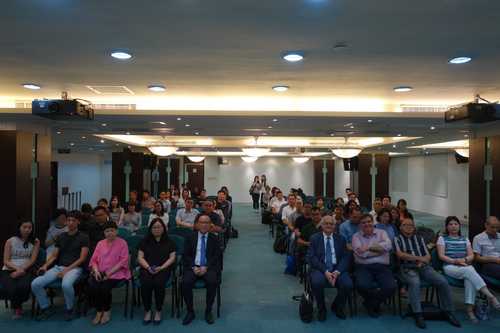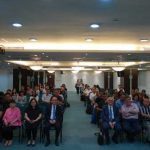 The organisers, speakers and trainees at the opening of the training
The organisers, speakers and trainees at the opening of the training
In order to enhance the development of Macao as the commercial and trade co-operation service platform between China and Portuguese-speaking countries, particularly, as a distribution centre for food of Portuguese-speaking countries among the “three centres”, and assist the food brands from Portuguese-speaking countries and Macao food enterprises to open up the huge consumer market in Mainland China, the Enterprise Training on “How to Sell Food & Beverage Products to China” which is jointly organised by the Macao Trade and Investment Promotion Institute (IPIM) and the Macao office of Enterprise Europe Network Central China (EENCC Macao), and supported by EU SME Centre was held today (28th) at the Multi-Functional Conference Hall of IPIM on the 19th floor of Edificio China Civil Plaza. The training attracted more than 100 representatives of local chambers of commerce and enterprises.
Branding Experts Decipher the Essentials of Entering the Mainland’s Market
With the changes in social consumption habits, the demand of consumers from Mainland China for high-quality food from abroad continues to increase. Targeting at companies interested in exploring the Mainland’s market, the training session allows distributors of foreign food products, especially of the brands from Portuguese-speaking countries and Macao’s brands, to deepen their understanding of the actual operations for their entry into the food market in Mainland China.
Delegation to Draw Wisdom from Successful Enterprises in Sichuan in the Fourth Quarter
Rafael Jimenez, advisor of EU SME Centre Business Development, and Bjørn Hembre, general manager of BRANDITAT, were invited to be the keynote speakers for the training. The whole-day training addressed the procedures and labelling requirements for food importation to Mainland China, as well as real case analysis of different overseas brands setting up factories in Mainland China and the relevant operations thereof, such as food product research and development, regulations and inspections. The speakers also taught marketing strategies, promotion and application of e-commerce platform for selling imported foods. Discussion and Q&A sessions were well received by the participants, who keenly sought advice from the speakers on issues such as practical operations of food labels approval procedure, customs clearance and import duties, what importers need to pay attention to when exporting food from their country of origin, marketing in Mainland China, etc.
Moreover, the organiser will arrange for the trainees who have completed the course to visit Sichuan, through which they can study the operating facilities of foreign food companies in Sichuan and learn from their successful entry to the Chinese market.
View gallery



